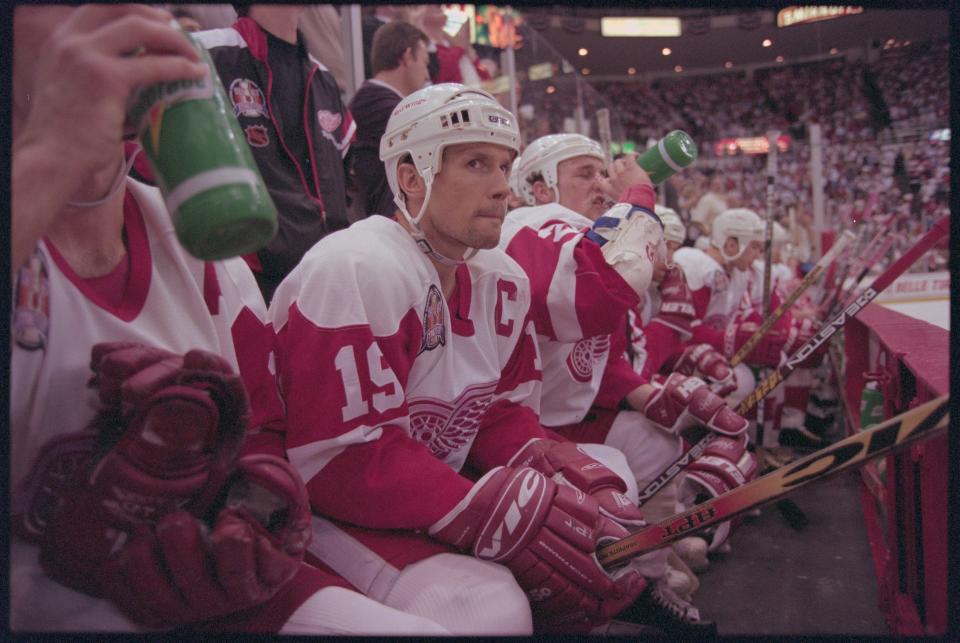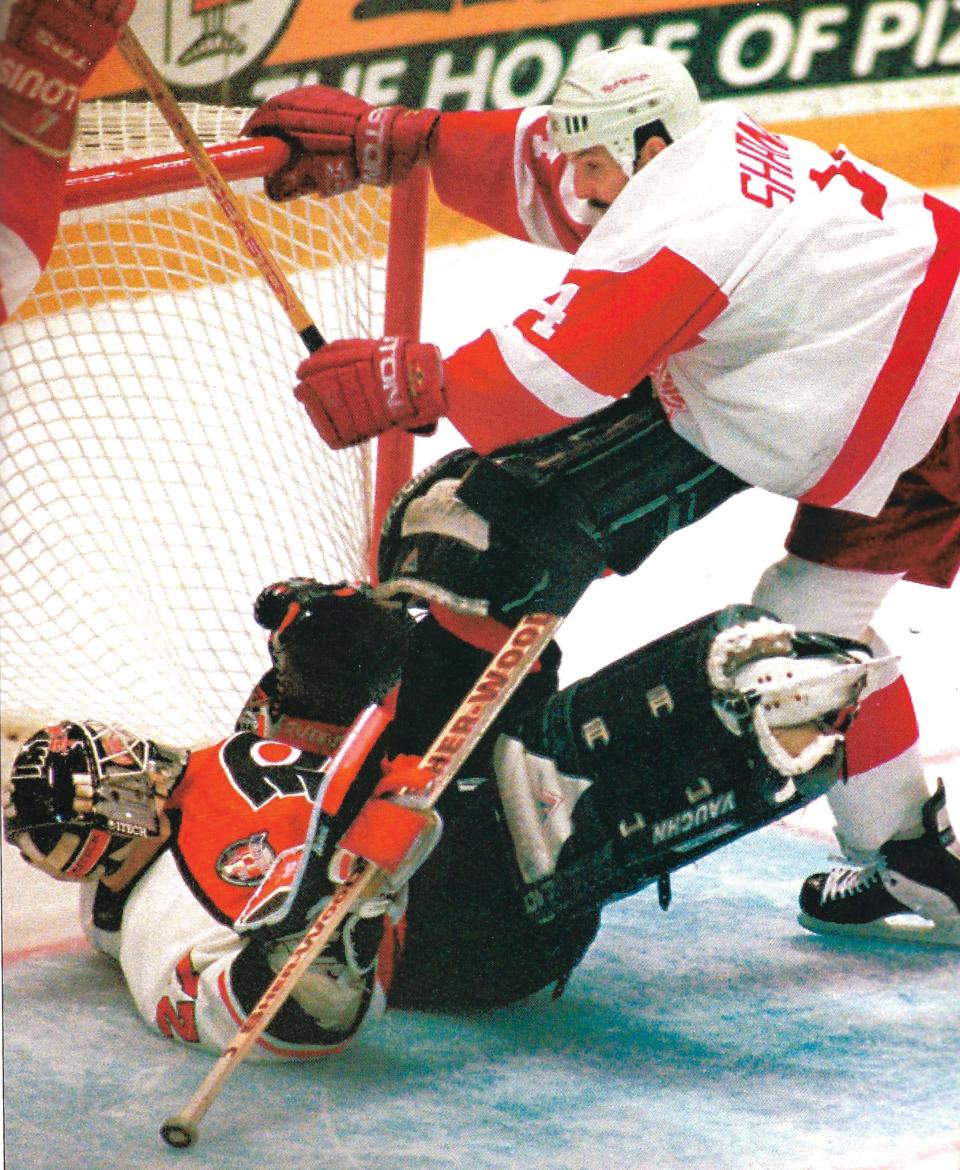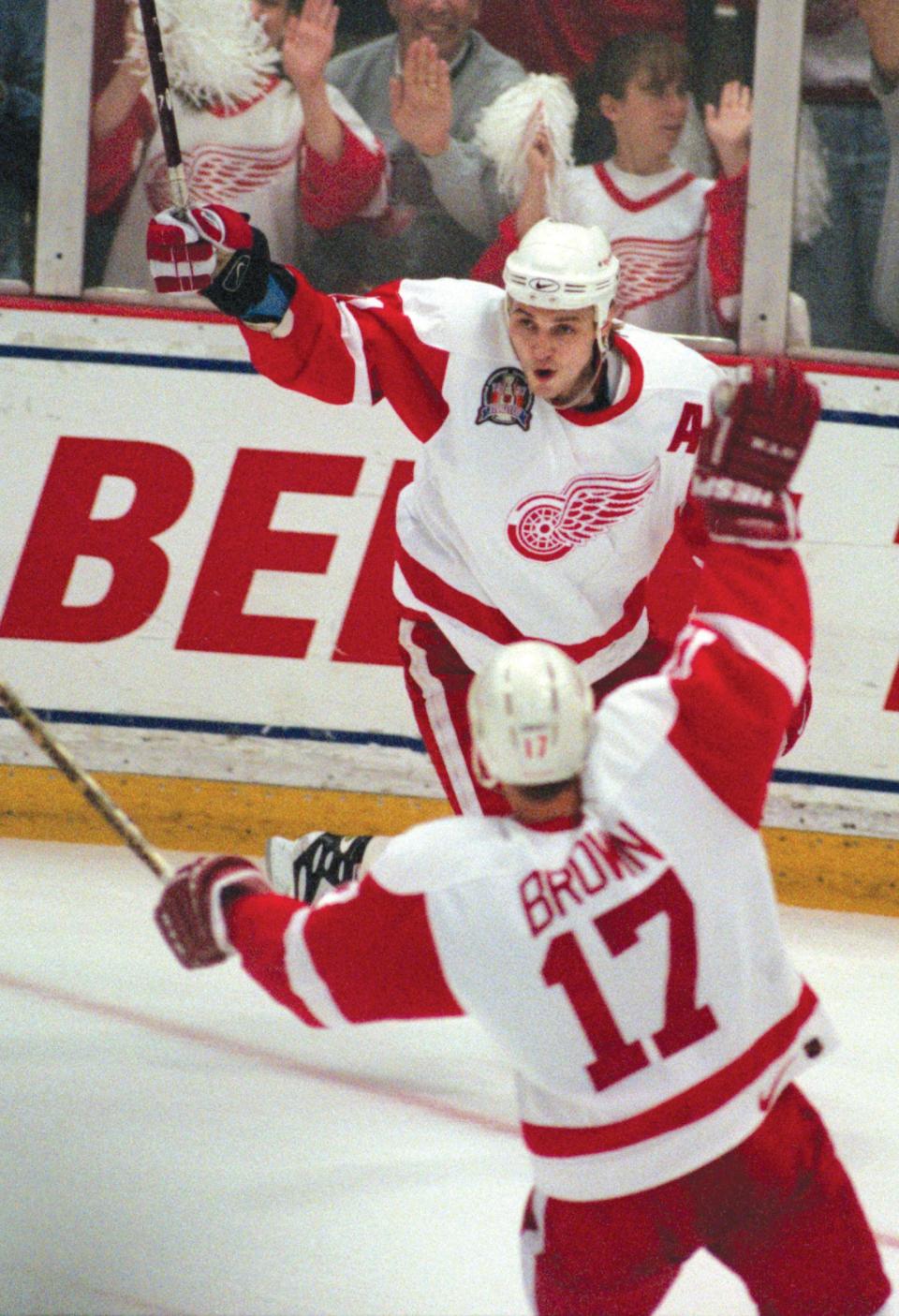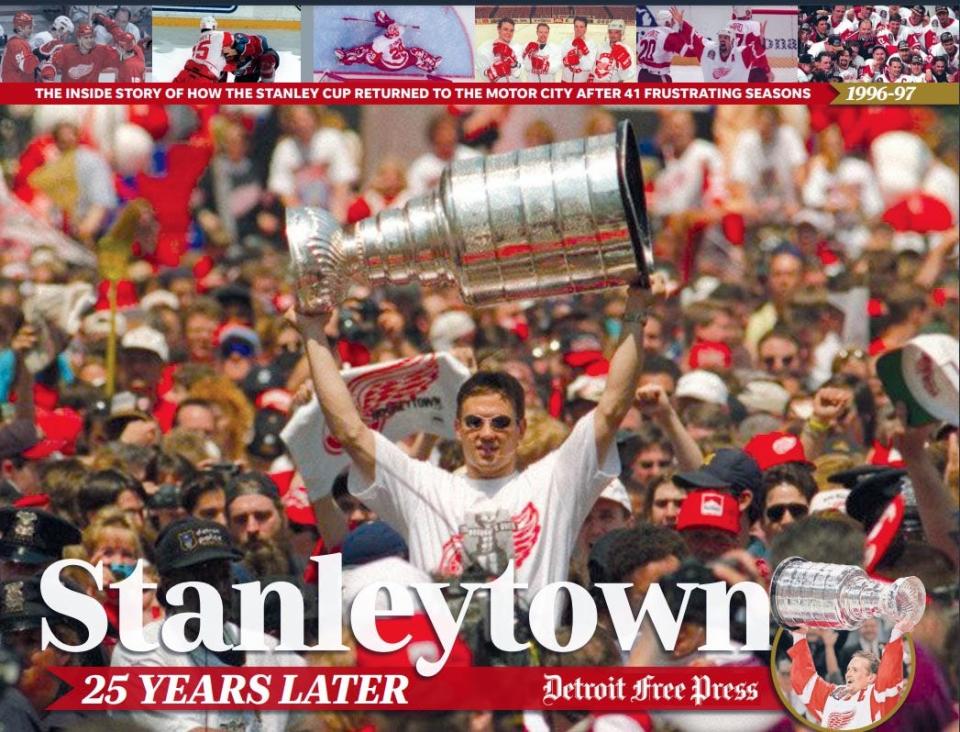Road to Stanleytown: Dominant Game 3 has 1997 Red Wings eyeing Stanley Cup sweep
In the spring of 1997 — a quarter-century ago — the Detroit Red Wings embarked on their quest to end a 42-year Stanley Cup drought.
The Free Press has commemorated that historic quest with a new book: “Stanleytown 25 Years Later: The Inside Story of How the Stanley Cup Returned to the Motor City After 41 Frustrating Seasons.”
Day 51: June 5, 1997
The backstory: Forget about the Red Wings’ 42-year Stanley Cup drought. To end that, they first had to do something about another repugnant streak, although lesser known. They had lost seven straight games in the Stanley Cup Finals on home ice — two in 1964 against the Maple Leafs at Olympia, three in 1966 against the Canadiens at Olympia and two in 1995 against the Devils at Joe Louis Arena. But in 1997 the underdog Wings carried a two-games-to-none lead against Philadelphia into Game 3 at The Joe. Only three of the 40 teams to fall behind 2-0 overcame that deficit in a seven-game finals. No wonder the talk in Detroit wasn’t whether the Wings would end their 42-year drought but whether they could end it at home.
Little red car flags dotted all the roads. An inflatable King Kong with a Wings jersey was added to the Fisher Building. (Steve Schrader wrote in the Free Press: “The heck with Fay Wray, he wants Stanley.”) The fandemonium skyrocketed, arguably surpassing the Pistons of 1989 and approaching the Tigers of 1984. Meanwhile, for their latest last gasp, the Flyers changed goalies again — from Garth Snow back to Ron Hextall — figured to play without concussed defenseman Paul Coffey — who was having a horrible series, anyway — and were expected to play their best game — according to all the Wings and the Flyers’ superstar, Eric Lindros, whose team was 6-1 on the road during the playoffs. As an emotional night played out on the riverfront, the script unfolded unexpectedly and the final chapter appeared on the horizon.
WINGS TODAY: Detroit changed in the 40 years since Mike Ilitch bought team from Norris

Game 2: “How sweep it is!” That was the Free Press headline. “It’s Wings or a Prayer.” That was the Philadelphia Inquirer headline. Instead of the usual 4-2 score, the Wings totally destroyed the Flyers, 6-1. In two nights, before the hometown fans, the Detroit Red Wings, at long last, after so much frustration, after the collapse in 1966, the debacle in 1995 and the Colorado Avalanche with archvillain Claude Lemieux in 1996, could win their first Stanley Cup since 1955. And, to boot, they could do it in a sweep. Of their seven Cups, the Wings had won Nos. 3 and 5 in sweeps, each time as the favorite.
No. 7, if they could pull it off, would be just as dominant, but as an underdog and with the added weight of 41 consecutive failed seasons. In 1943’s sweep of the Bruins, the Wings outscored Boston, 16-5, with road shutouts in Games 3 and 4. In 1952’s sweep of the Canadiens, the Wings outscored Montreal, 11-2, with home shutouts in Games 3 and 4. Through three games in 1997, the Wings had outscored the Flyers, 14-4. Mitch Albom captured the Cup Fever spreading like wildfire across Michigan with this start to his Game 3 column:
The hinges are coming loose, the rusty bolts are rattling and the door that for more than four decades has separated Detroit from the coveted Stanley Cup is about to shatter into a million pieces. The Red Wings earned their third victory of this championship series with a force that could burst a dam, a defense that could hold back time, and a speedy confidence that bordered on destiny. So mighty was their domination of the dazed and confused Philadelphia Flyers that the Wings scored their goals as if chosen from an assortment pack:
Steve Yzerman on a classic slap shot. Bang! Red light! Sergei Fedorov on a steal and a shot. Bang! Red light! Martin Lapointe on a perfect feed. Red light! Fedorov again on a rebound. Red light! Brendan Shanahan — perhaps tired of the conventional methods — standing behind the net, ricocheting the puck off the Flyers’ goaltender.
Red lights, all night long. Heck, even the goaltender, Mike Vernon, got an assist. On the final goal, another by Lapointe. The goaltender?
The door comes tumbling down. …
The Wings, in winning Game 3, 6-1, have not only remained perfect against the Flyers, scored 14 goals in this series, and rattled the very rafters of Joe Louis Arena, they also have performed a sweet act of alchemy:
They’ve turned “if” into “when.”
The door comes tumbling down.

The nitty gritty: Here’s the Game 3 recap from “Stanleytown 25 Years Later” written by Jason La Canfora:
Steve Yzerman stood motionless at the blue line while a packed Joe Louis Arena saluted him for a full 15 seconds. His name hadn’t even been announced. It didn’t have to be.
“Ste-vie! Ste-vie! Ste-vie!”
“It really gets your heart pumping,” Yzerman said afterward. “It gave me the chills.”
He was Detroit. The Red Wings were his team. This was his moment. This was their year.
The Wings were closer than ever to the Stanley Cup they had sought for 42 years after a 6-1 thrashing of the Flyers in Game 3.
They were one victory from turning a dream into a reality for their captain, the guy who blocked shots with a five-goal lead and five minutes to play, the guy brought to Detroit in 1983 when the team had few fans.
“When he raised his stick to the fans … that’s what it’s all about,” associate coach Dave Lewis said of Yzerman’s attempt to quell the cheers. “That’s the bond between this city and Steve Yzerman.”
The 19,983 fans never let up in the Wings’ first victory on home ice in the Stanley Cup Finals since April 16, 1964, a 4-3 victory over the Toronto Maple Leafs at Olympia Stadium.
“It’s crazy — it’s a good crazy, not in a bad way,” grinder Darren McCarty said. “It’s been dubbed Hockeytown. … You can see why.”
Yzerman and his teammates made them go wild for three periods.
Sergei Fedorov continued his marvelous spring as well, scoring twice and assisting on two other goals. Martin Lapointe also scored twice. Mike Vernon even recorded an assist.
For the first time in the series, though, Vernon yielded the opening goal when John LeClair put in a rebound on the power play 7:03 into the game. But the Flyers’ first lead of the finals lasted only two minutes.
At 9:03, Yzerman tied it with a blistering power-play slap shot.
“Ste-vie! Ste-vie! Ste-vie!”
The crowd erupted, the bond between player and fan never stronger.
“That was a special moment for all of us,” Brendan Shanahan said.
Entire sections of fans seemed to have “Yzerman 19” on their backs, from a guy wearing a Peterborough Petes sweater to kids in T-shirts. There was little doubt the agony of 1995, when the Wings were swept by New Jersey in the finals and Yzerman was limited to one point, burned within their hero.
Yzerman now had goals in the first three games of the finals after scoring four in the previous three rounds.
“He’s done it all for us,” coach Scotty Bowman said.
In Game 3, he sent the message that his team would not be denied. Then he passed the torch to Fedorov.
Fedorov burst into the zone, took the puck off Karl Dykhuis’ stick as he was falling down, shook off Joel Otto’s check and beat goalie Ron Hextall. That made it 2-1 2:02 after Yzerman’s goal.
Fedorov and Yzerman did it on defense, too, helping shut down the Legion of Doom with Nicklas Lidstrom during a 5-on-3 power play for 1:20, with Yzerman diving to smack the puck out of the zone.
“Ste-vie! Ste-vie! Ste-vie!”
Lapointe, not long after escaping the penalty box, made it 3-1 with a minute left in the first period. Fedorov and Doug Brown had the assists. When the horn sounded to end the period, Yzerman was alone near center ice. Another salute.
“Ste-vie! Ste-vie! Ste-vie!”
In the second period, Fedorov and Shanahan scored. Vladimir Konstantinov delivered the hit of a lifetime: Dale Hawerchuk turned his head in the middle of the rink for a pass. Lying in wait was Konstantinov, who turned his shoulder into Hawerchuk’s chest and sent him sprawling.
Shanahan’s goal came 24 seconds after the hit, when from behind the net he banked the puck off Hextall’s pads for a 5-1 lead. Hawerchuk, a future Hall of Famer, never played again.
“That was the epitome of his game, right there,” Lewis said years later. “Hawerchuk was one of the most respected players in the league, but Vladdie didn’t care who you were or where it was, he played his game. … He just freight-trains this guy at center ice. Our guys were on the bench going, ‘Wow.’”
Lapointe, with another Fedorov assist, scored again early in the third period for the 6-1 final score.
Fedorov’s big night gave him eight goals and a team-high 20 playoff points — after going scoreless in the first four games. “A great playoff,” Bowman said.
Fedorov’s second goal was another gem. Slava Kozlov fired a point-blank shot that ricocheted off Hextall’s stick and came out top to Fedorov, who rifled an even faster shot past Hextall.
A few days earlier, Fedorov had said: “Sometimes people think I am not trying because I am not in corners all the time. But maybe best way for me to help team is to watch and wait, then, at the very right moment, get like red-hot metal.”
Asked after Game 3 whether he was saving his best for last, Fedorov replied simply: “Yep.”
Flyers coach Terry Murray said “that game was an embarrassment” in his opening remarks. He concluded by saying, in his best Canadian accent, “Detroit are just too good a hockey club.”
Eric Lindros would end up with as many penalties (two) as shots. With two assists and a minus-4 rating after three games in his first finals, Lindros, when asked to assess his play, glared at the reporter and walked out of the locker room.
Yzerman long knew the agony of a disappointing playoff series and facing painful questions from the media. At the final horn of Game 3, Yzerman should long remember how The Joe reverberated with one last chant:
“Ste-vie! Ste-vie! Ste-vie!”
“Sweep! Sweep! Sweep!”
STANLEYTOWN DAY 50: 1966 Red Wings discuss ill-fated 2-0 lead ahead of '97 Wings' Game 3
DAY 49: Red Wings unfazed by Flyers' adjustments, take Game 2
DAY 48: Flyers reduced to 'Team Chaos' after 1997 Red Wings ring their bell
The three stars: As selected by the Free Press’ Steve Schrader: “No. 1 Sergei Fedorov — Two goals, two assists, including the goal that put the Red Wings ahead to stay. This is a guy once accused of disappearing in the playoffs. No. 2 Steve Yzerman — Captain, our captain. He scored the Wings’ first goal, played sound all-around hockey, and helped kill off a 5-on-3 penalty with Fedorov and Lidstrom. No. 3 Nicklas Lidstrom — Another solid defensive game and one reason the Flyers had only 15 shots through two periods. Penalty-killing crucial early. Uh, where was the Legion of Doom?”
Goat of the game: Schrader selected referee Kerry Fraser: “Must not have a vacation condo rented till July. Why else would he call four penalties on the Wings to one on the Flyers in the first period, once giving Philly a 5-on-3? The crowd responded with its usual Fraser chant.”
The turning point: Schrader singled out the big penalty kill: “When the Wings killed off the 5-on-3 with a 2-1 lead. Fraser sent Slava Fetisov and Tomas Sandstrom to the penalty box within 40 seconds of each other, but the Flyers didn’t get a shot on goal.”
Worth noting: As expected, Coffey, the former Wing, missed Game 3 because of a concussion suffered on a hit to the jaw from Darren McCarty’s shoulder. McCarty said his hit was clean yet forceful. “I knew I hit him pretty good,” he said. “The puck was in our end and in a situation like that you’ve got to make sure you get them out of the play. When you go right through somebody you know it. He was trying to keep the puck in. Sometimes when you reach out to poke the puck you leave yourself vulnerable.” McCarty and Coffey were good friends when they were teammates, and McCarty said he idolized Coffey as a kid. “I don’t think about anything like that,” McCarty said. “As my friend, I hope he’s all right, but there’s no friends on the ice. Your friends are the guys on your team.” … Coffey was replaced by Michel Petit, who, according to the Philadelphia Inquirer, “saw irregular action with an assortment of teammates.” … The Wings outshot the Flyers, 29-22, and converted three of five power plays. The Flyers went 1-for-7 with the man advantage. … No Wing took more than three shots. Fedorov scored on two of his three. Shanahan, the league leader in playoff shots, took only one, which produced the Wings’ fifth goal.

A surging Sergei: During a fairly forgettable regular season that included stints as a fourth-line center, a defenseman, on the injured list and in the coach’s doghouse, Fedorov posted 63 points — five fewer than the number of assists he had in 1995-96, when he led Detroit with 107 points. When he went scoreless in the first four playoff games, old accusations cropped up that he tended to sleepwalk through the playoffs. Well, in the last four games, he had three goals and four assists. In the last eight games, he had six goals and seven assists. His 20 points led the Wings — and marked the third straight postseason he had reached 20 points.
“Sergei has played terrific for us all playoffs,” linemate Doug Brown said. “He got the statistics tonight to bring notice to his play.” Keith Gave wrote in the Free Press that with his two-goal, two-assist night Fedorov “stepped up to the counter at the Banke du Hockey le Stanley Coupe and made another handsome withdrawal.” After the season, Fedorov’s contract was to expire and he could become a restricted free agent. Negotiations between the parties broke off in March with the intention to resume after the playoffs. Should he leave, though, the Wings would get five first-round draft picks. All that, though, was down the road. On the night of his masterful Game 3, Albom wrote:
You could spend all morning talking about the stellar efforts of the Wings. But a special word here for Fedorov, who scored his first goal of the night on a stolen puck, a sprint and a shot right through a flailing Hextall. It was vintage Sergei, done by himself, with opposing players gasping for air and reading his number from behind.
His second score was another perfect position. Kozlov moved in on Hextall, closer, closer, untouched, then fired a breathing-distance shot. It ricocheted off the goalie’s stick, came out top to Fedorov, who rifled it past him for the big red light. …
He played hard and fast and was all over the ice. Let’s face it. He’s been doing that the latter half of the postseason. “A great playoff,” admitted the usually reserved Scotty Bowman.
Fedorov has so much pure, unfiltered talent, that you simply cannot discount him, even if you haven’t noticed him for a while. He has risen to the top when he was needed the most, and for those of you who remember when this was exactly his problem, well, things change, don’t they? Last time in the finals, in 1995 against New Jersey, the Wings were swept. This time, they are likely to do the sweeping.
And Fedorov, of all people, may wield the broom. His speed is impossible for the Flyers to defend, and his stick-handling quickness makes him a demon on defense.
“Are you saving your best for last?” I asked Fedorov after the game.
“Yep,” he said, in his best American.
Give the man his due. He has carried his load.
They said it: From Flyers coach Terry Murray on The Next One, Lindros: “I need more out of him than what we got tonight. But I also need more out of John LeClair and Mikael Renberg. I need more from our defense. We need more from everybody. From Shanahan on the 5-on-3 in the first period: “As a team, we weren’t too happy with the calls. They were both obstruction calls, and it’s not too often you get a call like that when you’re killing a power play unless there’s a scoring chance. But we tried not to direct our anger at the referee. We said, ‘Let’s direct it at just killing this thing off.’” From Murray again: “One win. We just want one win. If we can get that, we can look at the next one.” From Fedorov: “I’ve been a Red Wings player for seven years, but on television they will say I’m a Russian. Fans are tired of hearing about that.” From Flyers defenseman Eric Desjardins: “We have to change everything; we have to show a little pride.”
Off the ice: The Red Wings’ own Karen Newman made a crowd-pleasing entrance before belting out the national anthem. Newman, dressed in a biker outfit, rode out on the back of a motorcycle that was part of the pregame festivities designed to fire up Joe Louis Arena during the playoffs.
Famous last words: How the teams change but the E-word stays the same. From Bowman after a 5-2 Game 3 loss to New Jersey in 1995: “It was an embarrassment to the National Hockey League.” From Murray after a 6-1 Game 3 loss to Detroit in 1997: “We’ve got to find a way to stop the bleeding. The game today was an embarrassment.”

Relive the glory: The Free Press has crafted a 208-page, full-color, hardcover collector’s book with fresh insights and dynamic storytelling about the 1996-97 Wings. It’s called “Stanleytown 25 Years Later: The Inside Story on How the Stanley Cup Returned to the Motor City after 41 Frustrating Seasons.” It’s only $29.95 and it’s available at RedWings.PictorialBook.com. (It’ll make a great Father’s Day gift for the Wings fanatic in your life!) Personalized copies available via myersgene@comcast.net.
More to read: Another new Wings book arrived in April from Keith Gave, a longtime hockey writer for the Free Press in the 1980s and 1990s: “Vlad The Impaler: More Epic Tales from Detroit’s ’97 Stanley Cup Conquest.” It is available through Amazon and other booksellers and a portion of the proceeds is earmarked for the Vladimir Konstantinov Special Needs Trust. (Plenty of Gave’s prose also appears in “Stanleytown 25 Years Later.”)
Even more to read: Red Wings beat reporter Helene St. James, who helped cover the 1997 Stanley Cup run, recently wrote “The Big 50: The Men and Moments That Made the Detroit Red Wings.” Featuring numerous tales about the key figures from 1997, “The Big 50” is available from Amazon, Barnes & Noble and Triumph Books. (Plenty of St. James’ prose also appears in “Stanleytown 25 Years Later.”)
Stay informed on what’s happening across Michigan: Subscribe to our news alert emails.
Follow the Free Press on Facebook and Twitter for more news.
Your subscription makes work like this possible. Get exclusive subscriber content and more here.
This article originally appeared on Detroit Free Press: Road to Stanleytown: Big Game 3 had '97 Detroit Red Wings eyeing sweep

